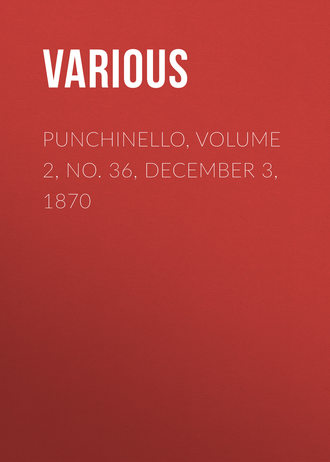 полная версия
полная версияPunchinello, Volume 2, No. 36, December 3, 1870

Various
Punchinello, Volume 2, No. 36, December 3, 1870
MAN AND WIVES
A TRAVESTY.
By MOSE SKINNER.
CHAPTER SECONDLOVEThe Hon. MICHAEL LADLE and ARCHIBALD BLINKSOP were interrupted in their conversation by BELINDA, who sent off the former under pretence that the croquet players were waiting for him, or, as she expressed it, it was "his turn to mallet."
As soon as he was fairly out of sight, she turned to ARCHIBALD, and said; "Come with me."
"What for?" said ARCHIBALD, as she seized him by the arm and hurried him into the shrubbery. "Recollect," he added, "that I am an orphan, with a constitution never robust."
She made no reply till they were screened from observation.
"You needn't be afraid, you little fool," she said. "Sit down on that stump."
ARCHIBALD tremblingly obeyed her.
She imprisoned his fluttering hand in hers, and smoothed his hair reassuringly.
"ARCHIE," she murmured; "dear ARCHIE."
"Oh, don't, don't talk that way," said ARCHIBALD. "You make me afraid of you."
"Afraid!" she returned. "And of me? Oh cruel, cruel ARCHIBALD. Is it for this that I have passed many a sleepless night, awaking unrefreshed with haggard orbs? Is it for this that I've pined away and refused meat victuals?"
She paused. Her heart was beating violently. She took from her pocket a copy of the Ledger, adjusted her eye-glasses, and continued:
"ARCHIBALD BLINKSOP, for weeks I have basked in the sunlight of your existence. Your celestial smile, shedding a tranquil calm o'er my perturbed spirit, has been my daily sustenance. Your ethereal form, beautiful as an houri, has, with its subtle fascination, enthralled and steeped in bliss my innermost soul, lifting me as it were into a purer, a holier existence. Your—"
"Oh-h," moaned the wretched ARCHIBALD, "please stop. That's COBB, Jr. I know it is. When I was sea-sick on the canal, they read a chapter to me just like that, instead of giving me an emetic, and I was out of my head all next day."
"But you do love me, don't you, ARCHIBALD?—just a very small fragment, you know."
She seized him by the ear and kissed him twice.
"Come, own up now," said she, "that from the first moment you saw me, you have felt a sort of a spooney hankering, and a general looseness, including a desire to write poetry and use hair-oil, and wear pretty neckties; a sort of a feeling that your clothes don't fit you, and you can't bear the sight of gravy, and dote on lavender kids, and want to part your hair in the middle. That's being in love, ARCHIE. That's—"
At this juncture voices were heard calling for ARCHIBALD.
"Oh, do, do let me go," he pleaded.
BELINDA grasped him firmly by the collar. "Heaven knows," said she impressively, "that I have wooed you thus far in a spirit of the most delicate consideration. Now, I mean business, I want a husband, and by the Sixteenth Amendment, you don't stir from this spot, until you promise to marry me!"
"But—but—I don't want to get married," said ARCHIBALD; "I—I—ain't old enough."
She glared at him menacingly.
"Am I to understand then," she shrieked, "that you dare refuse me?" And she laughed hysterically.
"Oh, no, no. I wouldn't. Of course I wouldn't," groaned the ghastly youth. "I'll promise anything, if you'll only let me go."
Thus it was, mid the hushed repose of that lovely June twilight, while all Nature seemed to pronounce a sweet benediction, that these loving hearts commingled. The soft hum of the June-bug seemed to have a sweeter sound, and the little fly walked unmolested across their foreheads, for they were betrothed.
CHAPTER THIRD.
WHERE THE WOODBINE TWINETH.
Notwithstanding the thrilling events enacted near by, that modest production of Nature, the woodbine, still continued to twine in all its pristine virginity. And meanwhile, JEFFRY MAULBOY is at the appointed rendezvous, waiting for ANN BRUMMET.
She comes.
But why that glazed expression, and that convulsive twitching of the lips?
She is chewing gum.
"Hilloa, JEFF," said she. "Mean thing. Been here a whole day, and not a single word about my new overskirt. How does it hang behind?"
What reply does this cruel, this heartless man make?
He took a chew of tobacco, and said:
"Oh, bother your overskirt. Is that the 'something very particular' you wanted to see me for?"
"Oh no," she replied; "I forgot." She looked cautiously round, and added:
"Say, JEFF, folks are talking about us awfully."
"Let 'em talk," was the rejoinder.
"Oh, yes," she replied. "Of course you don't care. The more a man is talked about the better he likes it, and the more he's thought of. But it's death to a woman."
"Well, I don't care any way," said JEFFRY.
"Yes you do care too," she replied. S'posen it should get to the ears of that rich widow you're engaged to. 'Twould be all up with you there, sure, JEFF. She ain't burdened with principle, the Lord knows, but she's got jealousy enough to break the match short off, and kill you besides, if she hears of it.
"And she'll hear of it anyhow, if they keep up their infernal clack," said he fiercely. "I'd like to choke the whole confounded pack."
"The talk would all die out," said ANN slowly, "if I should go away."
"Any fool can see that," replied he. "What do you mean?"
"I've been thinking of going," she continued, "for six months. I'm a poor relation, and Mrs. LADLE hates me. And as for BELINDA, she has so many good clothes, I can't take any comfort seeing her round."
"Where to?" inquired JEFFRY incredulously.
"Oh, anywhere," she replied. "I can dance a jig, you know. I'll go to New York, and let myself as the 'Eminent and Graceful Queen of Terpsichore, imported from Paris at a cost of Forty Thousand Dollars in Gold.' And then I'll make a tour of the New England States. Or I'll learn to play the banjo and get off slang phrases, and then I'll appear as 'The Beautiful and Gifted Artist, ANNETTA BRUMMETTA, who has, by her guileless vivacity, charmed our most Fashionable Circles.' Or I'll go as Assistant Teacher in a Select Boarding School for Young Ladies. I ain't proud, you know."
JEFFRY grinned. "Let me advise you," said he, "to go right off to-morrow. I'll help you pack your trunk inside of an hour, if you say so."
"That ain't the point," she retorted sharply. "I ain't got rid of so easily as that, I tell you."
"What do you mean by that?" he inquired, with a scowl.
"I mean just this," she returned. "I won't go at all if you don't do what's right by me. If you'll agree to my terms I'll go, and not without."
"Your terms!" said he, with a sneer. "Well, that is a go. What may your 'terms' be?" he continued, derisively.
"Marriage," replied she; "private if you say so, and a remittance of fifty dollars a month for six months."
He laughed in her face. "Marry you? Well, I guess not," said he. "Do you take me for an idiot?"
"You ain't obliged to stick by it," she continued. "We're in Indiana, ain't we? We'll take a minister and a lawyer along with us. While the minister is marrying us, the lawyer can be at work on the divorce papers. When you are JEFFRY MAULBOY again, a single man, and I'm once more ANN BRUMMET. spinster, I'll go away and never trouble you again. There's no risk. I go in ANN BRUMMET, and come out ANN BRUMMET, all inside of two hours, and there's nobody to tell of it. The lawyer and minister are used to it, you see, and the secret's safe with them."
JEFFRY MAULBOY took an unusually large chew of tobacco, and thought it all over.
"I won't do it," he finally said.
"All right, then," she replied; "I'll write to Mrs. CUPID and tell her the whole story, and I'll stay here besides. It'll be hard enough on me for a while if I go, and harder still if I stay; but I'll do it to spite you. I'll break off your match with Mrs. CUPID if I do stay, now mark my words."
JEFFRY MAULBOY walked back and forth, and emitted the choicest string of curses that his extensive and valuable collection enabled him to cull. At last he stopped in front of her, and said savagely:
"I'll do it. But if you ever lisp a word to any living soul till I'm safely married to CUPID, I'll kill you, dead sure. Do you hear that?"
"When and how is the thing to be done?" he growled again.
"The sooner the better," was ANN'S reply. "If you don't hear from me by to-morrow noon, go to the Half-way House at Forney's Crag. That's all you've got to do. I'll have the lawyer and minister both there. You'd better be there too. That's all I say."
Alone in his room, JEFFRY admitted that ANN had been too smart for him.
"And I'm mighty afraid that, somehow or other, the old she-dragon will get the best of me yet in this infernal business," he soliloquized. "Anyhow, I'll sleep on it," and he went to bed.
He got up in the morning, firmly resolved to break his engagement with ANN.
"She was only bluffing me last night," he said. "She daren't tell CUPID." But he didn't feel easy for all that.
After breakfast he took his hat and started out.
"Where are you bound, JEFF?" inquired ARCHIBALD.
"Anywhere," was the reply. "Come along."
JEFFRY was awful dull company, so Archibald thought. He took very large chews of tobacco, and expectorated freely into the eyes of the small boys whom they chanced to meet, and if he didn't make a good shot, he swore awfully. Once he went away across a field on purpose to kick a very small dog, and ARCHIBALD waited for him.
"Why, JEFFRY," said ARCHIBALD, "what ails you? You're awfully down in the mouth this morning."
"And so you'd be if you was in my boots," was the reply.
And then he up and told ARCHIBALD the whole story.
The latter was so thoroughly dumbfounded that a decently-smart boy could have blown him over without any apparent effort.
"Why, JEFF," said he, "only to think of it. Ain't it awful? And ANN BRUMMET, too; ain't I glad it ain't me, though."
"That's no way to console a fellow, you fool," said JEFFRY. "You'd better offer to help me out of the scrape."
"Why, so I will, of course," said ARCHIBALD. "If I hadn't saved your life, of course you wouldn't have got into it; and so I feel bound, you know, to see you out of it. What shall I do?"
"Why, just go over to the Half-way House, and tell ANN I can't come. Tell her I've got the small-pox, or broke my leg, or my old man's dying—or anything, so that she understands I can't come."
"You'd better give me a letter," said ARCHIBALD, "and I'll slip it under her door and run off. I never could remember all that, I should be so flustered, you know."
"No," replied JEFFRY, "I shan't give you any letter. I ain't fool enough to commit myself to any woman in black and white."
"Well," replied ARCHIBALD drearily, "just as you say. Oh, what a knowing man the Hon. MICHAEL is! He said you'd make me pay that debt of saving your life, sooner or later, and it's turned out sooner. But I'll go, JEFFRY, if I can get away from BELINDA. She tags me round everywhere, and wants to court me all the time. Ain't it dreadful? What time shall I go?"
"Three o'clock," answered JEFFRY. "Tell her I'd come if I could but I can't anyhow. Be sure and tell her that, and anything else you've a mind to."
(To be continued.)
PIGEON ENGLISH
Certainly newspaper writers are given to making very remarkable statements. In describing General CHANGARNIER, a newspaper lately informed us that "he stoops his head, which is sprinkled over with a few gray hairs when walking." Now, if the general's head be sprinkled when walking, we may fairly infer that the gray hairs, unless brushed off, remain upon it when it stands still. We are additionally mystified by the further statement—still with reference to the same officer—that "he enjoys the personal demeanor of the French people to a remarkable degree." This we are very much delighted to hear, although we have not the slightest idea what it means.
Corroborative
A late item of war news states that "the Prussians have advanced to Dole," while from several other sources we learn that the Prussians have come to Grief.

ANSWERS TO CORRESPONDENTS
Ambergris.—Can you give me the motto of the City of Strasbourg?
Answer.—We cannot at this moment recall the Flemish version of it, but it means, in English, "We make our own Pies."
Katrina Shwachenzittern.—We have had some difficulty in deciphering your manuscript. Your grievance, however, seems to be that one of your boarders, an Alsatian, keeps a ten-pound brass cannon in his bedroom, and fires a grand salvo with it whenever a French victory is announced. This, of course, is very foolish. The best way of putting a stop to it would be for your German boarders to keep guns of even larger calibre in their rooms, and fire the Frenchman down. You will then have a perfect right to charge all your boarders for extra fires.
Ney.—Please explain two things about the war. First: How did the Mobile Guard come to leave Mobile? Second: Is Francs-Tireurs the French for FRANK BUTLER'S black-and-tan terriers?
Answer.—We cannot perceive much difference between NEY and BRAY.
Artichoke.—You are mistaken in supposing total deafness to be an indispensable qualification in a candidate for the position of prompter to a theatre.
Flippertygibbet.—How is the belligerent attitude of the Russian Bear likely to affect the New York money market?
Answer.—Turn a rushin' bear into any market, and see what the result will be.
Paterfamilias.—I am the unhappy father of three brace of twins, and wish to dispose of one out of each brace. Can you advise me in the matter?
Answer.—If you don't mind being put in the Lockup, perhaps you had better apply to "Dr." LOOKUP.
Sad-you-See.—We cannot sympathize with you in your wail about the markets being "flat." Wait a while, patiently, and they will come "round."
Peter Dole.—Your questions about cooking turkeys for Thanksgiving Day are so multitudinous, that we can only reply to them generally. In Europe it is the usage for Crowned Heads and their families, only, to eat sausages with their turkey; and, if ever the true story of the Man with the Iron Mask comes to be unveiled, it is more than likely that the mystery will be found to hinge upon that fact.
A PRESIDENTIAL FLOUT
According to the Washington special despatches to the Philadelphia Inquirer, the President has tendered a Cabinet appointment to several distinguished members of the Union League of that city. Either from excessive modesty, however, or, as is probable, from prudent doubts as to their ability to fill the position, all of these gentlemen have declined to accept the offer.
It is surmised that the object of the President's recent visit to Philadelphia (ostensibly to see his old friend, Mr. BORIE), was to examine the roll of the League, comprising two thousand members, for the purpose of selecting one who might serve on a pinch to fill the office in question.
This was a bitter stroke of satire on the part of Mr. GRANT, since it is generally understood in Philadelphia, that, outside the ranks of the Mutual Admiration Society to which we have referred, there are no brains to be found among the Republicans of Philadelphia.
A Bubble of Air
What is the most favorable sort of weather for ballooning?
Highly favorable weather.
THE THREE CENTS
An Incident both Dramatic and True.
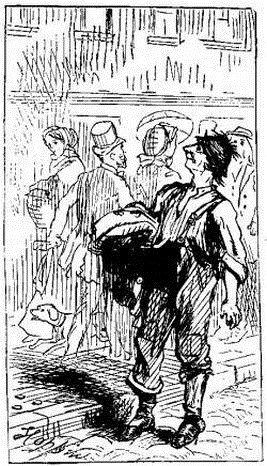
SLINEY, OF SWAMPVILLE, COMES TO THE CITY. AS HE SHAMBLES ALONG THREE BRIGHT CENTS FALL AT HIS FEET. AMAZEMENT OF SLINEY, WHO GAZES UP AT AN OPEN WINDOW, BUT, NOT SEEING ANY PERSON THERE, SUPPOSES THAT SHOWERS OF COPPERS ARE PECULIAR TO THE CLIMATE.
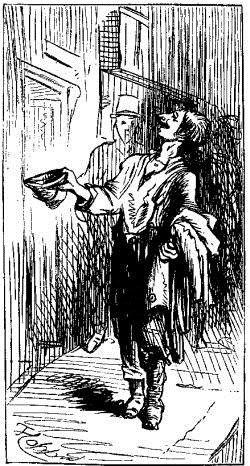
HAVING POCKETED THE COINS, SLINEY PROCEEDS UPON HIS WAY. HARDLY HAS HE GONE A DOZEN PACES WHEN THREE CENTS AGAIN RING DOWN UPON THE FLAG-STONES, AND SPARKLE THERE IN THE SUN. DELIGHT OF SLINEY, WHO AGAIN GAZES UP SMILINGLY AT THIRD-STORY WINDOWS, HOLDING OUT HIS HAT AS IF TO ASK FOR MORE.
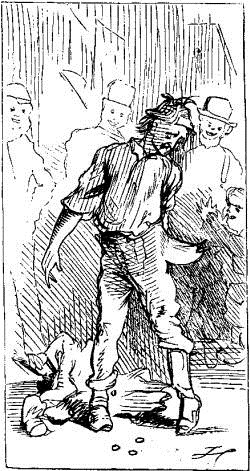
AGAIN SLINEY PROCEEDS TO POCKET THE COINS. BUT, HA!—WHAT IS THIS? HIS COUNTENANCE CHANGES: HIS LONG BONY FINGERS NOW FOR THE FIRST TIME DETECT THE FATAL FLAW IN HIS TROUSERS POCKET. 'TWAS HIS ORIGINAL CAPITAL, BROUGHT BY HIM FROM SWAMPVILLE TO INVEST IN STOCKS, THAT HE HAS BEEN PICKING UP ALL ALONG. AGONY OF SLINEY, WHICH IS AGGRAVATED BY THE RIBALD LAUGHTER OF SOME WICKED PERSONS WHO HAVE THROWN THEMSELVES UPON HIS TRACK.
THE LATEST BOSTON NOTION
The well-earned reputation acquired by Boston for leading the world in new ideas is so thoroughly established as to need no recapitulation here. We merely speak of it for the purpose of mentioning that city's last contribution to mankind, of this kind. They have a hotel there which advertises through the seductive fly-pages of our magazines in the following terms: "Courtesy to strangers is a marked feature in the management of—"
But we remember in time that we have no right to interfere with the advertising columns. However, it is a fact that there is a hotel in America where courtesy to guests is a feature, and of course a marked one. It is a cheering fact, and especially so just now, in this early fall, when we are all smarting with the fresh memories of our summer's sufferings at the hands of the hotel proprietors, their head clerks, and the rest of the rapacious crew. What an attractive picture it presents! A hotel where guests are treated with courtesy! Really, if anything could seduce us into making a visit to Boston, the desire to actually witness this surprising innovation upon our national customs would prove too strong for the reverential fear which keeps us distant worshippers of that American Mecca.
Odious Comparison
"She is a gem," remarked Mr. JENKINSOP, speaking of his red-haired wife.
"Yes—a diamond of many carats," was the low rejoinder of JENKINSOP'S friend, WINKLESOP.
ROYAL DEMOCRACY
It appears to have been decided that one of the royal princesses of England can be allowed to marry, without being obliged to find some royal prince for that purpose. Perhaps this course has been discovered to be possible from the fact that the stock of royal princes is getting short in Europe. Prussia has gobbled up any number of German ones, and bids fair to do so with the rest. But we prefer to think that this innovation is really due to the women's rights movement. Their platform is broad enough for the entire sex to stand on, and why should a princess, from the unfortunate accident of her birth, be debarred her natural right to fall in love with the man of her choice, and to marry the man she loves. At any rate we commend this change of policy to the leaders of the women's rights party, as a proof of the success their movement has gained, and advise them to send a series of congratulatory resolutions to the princess in question, upon her gaining her unquestioned right to consult her heart rather than a Lord Chancellor in the bestowal of her hand.
An Anecdote from Salt Lake
A GYPSY came to BRIGHAM YOUNG with a pony for sale.
"Why, the beast is half-starved," said BRIGHAM, running his hand over the pony's side. "You can count his ribs."
"That's more'n a chap could do with yours," retorted the gypsy.
BRIGHAM YOUNG did not buy that pony.
NATURAL HISTORY IN OUR PARKS
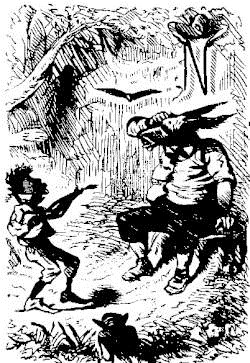
No greater tribute has yet been paid to the already improved condition of our city parks under the new régime, than the arrival in them of strange birds by which they had not hitherto been patronized. Within a few days past several owls have been captured in the solemn pines with which these delightful retreats have lately been made green, if not shady. The owl, as is well known, was regarded by the ancients as the Bird of Wisdom. He fully sustained his right to the title by letting severely alone the city parks while they were still dreary and disgusting wastes. The only night-birds by which these were, then occupied were of the featherless (and apparently motherless) kind, and were well known to the police. They were quite as watchful, it is true, as the genuine feathered owl that has just commenced to give its very extraordinary countenance to the parks, but then it was with other people's watches, not their own. It is with much concern that we hear reports of the slaughter of some of these solemn but beautiful owls that have come to ventilate their wisdom among us. The reports in question were very definite and unmistakable, most of them proceeding from revolvers handled by members of the Municipal Police Force, while others emanated from the barrels of shot-guns wielded by beery Teutons, who rushed frantically out from their sawdust lairs when they were told that the game was up—that is, that an owl was up a tree. This was scurvy treatment for the visitors. To "put a head on" an owl, which is already provided with one so large and so comical, appears to be a work both superfluous and inhuman. The only apology for it in this instance is, that these night-birds of prey were supposed by the police to have been attracted to the parks by the prospect of succulent suppers on the very well-fed sparrows by which these resorts are now thickly tenanted. The owls hooted at this notion; but their hooting was only answered by shooting, and the poor foolish Birds of Wisdom have been stuffed with tow instead of sparrows, and set up to form the nucleus of an ornithological Rogues' Gallery in the City Hall.
On visiting the Battery a few days ago, one of the park-keepers (himself looking in his bright new uniform somewhat like a blue-jay) expressed his conviction that, next spring, that time-honored pleasure-garden of the old Knickerbockers will be a paradise for song-birds such as it has not been since the original Swedish Nightingale warbled her "woodnotes wild" there a score of years ago, more or less. The sea-gulls, he thought (will Judge HILTON have the goodness to provide these park officers with manuals of ornithology?), would build their nests in the pine-trees with which the wide esplanade that stretches away to the water's edge will soon be bristling. Honest, but mistaken young man! As well might he have said that the sea-wall [a very substantial one, by the way] would build its nest in the melancholy pines. But it is reasonable to hope that pine grossbeaks will find their way thither, and that the German flutes of various finches will provide for the coming Bavarians and Hessians (should any be left after the siege of Paris and the sorties of the truculent TROCHU) a welcome such as has not heretofore been accorded to the strangers who at Castle Garden first set foot upon our shore.
The Bowling Green—late a nuisance and a pandemonium, now an oasis of verdure—has not as yet reported its owl, but the public eye is upon it, and the nocturnal marauder may yet be detected in the forks of the great willow-trees, which still retain their verdure. The sparrows are almost disproportionately numerous in this small park, but this may be accounted for. It has lately been laid down with new grass, the green, tender blades of which, just now beginning to crop out, are probably mistaken by the birds for "sparrow-grass" munificently provided for them by the Commissioners.









